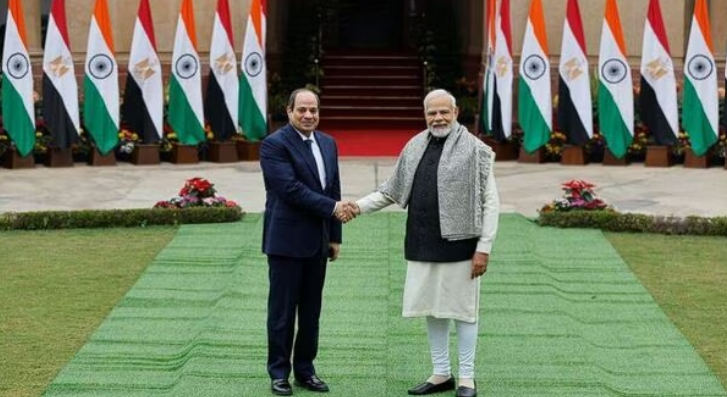High-Level Talks and Diplomacy
Indian Prime Minister Narendra Modi reached out to Egyptian President Abdel Fattah al-Sisi on a crucial phone call last Saturday to deliberate on Israel’s military operation in the Gaza Strip and its ramifications on the civilian population. This discussion occurred in the wake of Israel’s expansion of ground operations, coinciding with a UN appeal to halt the ongoing hostilities.
Concerns over Gaza Ground Operations
Although there has been no official statement from India regarding this matter, the Egyptian President’s Office has initiated an investigation. The press release revealed that El-Sisi received a call from the Indian leader, and the two leaders exchanged their perspectives on the recent developments in Israel’s military activities in the Gaza Strip. They emphasized the significance of de-escalating the current tensions, as these tensions profoundly affect civilian life and jeopardize the security of the entire Gaza Strip, according to a statement published on Saturday.
So far, Prime Minister Modi has engaged in discussions with Israeli Prime Minister Benjamin Netanyahu, Palestinian President Mahmoud Abbas, and King Abdullah of Jordan. The backdrop for these discussions is the unannounced Israeli ground invasion of the Gaza Strip, following 20 days of retaliatory airstrikes that resulted in the loss of over 7,000 lives. This incident occurred after Hamas incursions into southern Israel, leading to the death of nearly 1,200 people and the capture of more than 200 hostages. El-Sisi emphasized the efforts made by Egypt to coordinate regional and international actions aimed at achieving a ceasefire.
International Efforts and UN Resolution
Interestingly, India abstained from endorsing a UN General Assembly resolution on Saturday, calling for a humanitarian “ceasefire” to facilitate unimpeded supplies to Gaza. Jordan introduced this resolution on behalf of the Arab Group.
The Egyptian President issued a warning, stating that a ground attack on the Gaza Strip would have grave humanitarian and security implications. While Israel declared on Friday that the “second phase of the war” had commenced with Israeli forces entering the Gaza Strip, it refrained from explicitly labeling it as a ground offensive.
Egypt, situated along the borders of the Gaza Strip and Israel, has been at the forefront of international endeavors to deliver humanitarian aid to the beleaguered civilian population as shelling continues. The Egyptian leader stressed the urgent need for a coordinated international effort to achieve a swift diplomatic solution that ensures immediate, sustainable, and unobstructed delivery of humanitarian assistance. Additionally, he underscored the necessity of enhancing urgent humanitarian peacekeeping to safeguard civilian lives.
The President’s words echo the provisions of the UN General Assembly resolution, which was passed with 120 votes in favor, 14 against, and 45 abstentions. India, among the developing countries of the so-called Global South, refrained from casting a vote in favor of the resolution.
About the Conflict
The Israeli-Palestinian conflict is a deep-rooted and long-standing conflict between Israel and Palestine based on historical and territorial grievances. This conflict dates back to the late 19th century, when the Zionist movement, which called for the creation of a Jewish homeland in historic Palestine, gained power. As Jewish immigration to the area increased, tensions between the Jewish and Arab communities increased.
The conflict reached a crisis point in the mid-20th century, leading to the creation of the state of Israel in 1948. The event, known as the Nakba, displaced hundreds of thousands of Palestinians and marked the beginning of a long and multifaceted conflict. At the heart of the conflict are issues of territorial borders, the status of Jerusalem, Palestinian refugees and the right to self-determination. Over the years, numerous wars, uprisings and peace talks have characterized the Israeli-Palestinian conflict. Characterized by deep-rooted historical, religious and political factors, this conflict is one of the longest and most complex conflicts in the world. The conflict has far-reaching humanitarian, security and diplomatic implications and is generating international attention and efforts to resolve it and bring lasting peace to the region.
